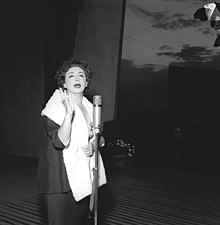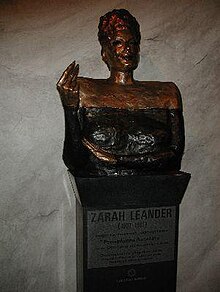Zarah Leander
Zarah Leander (German pronunciation: [ˈt͡sa.ʁa leː.ˈʔan.dɐ] ⓘ; 15 March 1907 – 23 June 1981) was a Swedish singer and actress whose greatest success was in Germany between 1936 and 1943, when she was contracted to work for the state-owned Universum Film AG (UFA).
Though she had taken no public political position and was dubbed an "Enemy of Germany" by Joseph Goebbels, she remained a controversial figure for the rest of her life.
[1][2] She was born as Sara Stina Hedberg in Karlstad, studying piano and violin as a child, and sang on stage for the first time at the age of six.
As a teenager she lived two years in Riga, Latvia (1922–1924), where she learned German, took up work as a secretary, married Nils Leander (1926), and had two children (1927 and 1929).
However, in 1929 she was engaged, as an amateur, in a touring cabaret by the entertainer and producer Ernst Rolf and for the first time sang "Vill ni se en stjärna" ("Do You Want to See a Star?
[citation needed] In 1930, she participated in four cabarets in the capital, Stockholm, made her first records, including a cover of Marlene Dietrich's "Falling in Love Again", and played a part in a film.
He wrote a song for Zarah Leander, "I skuggan av en stövel" ("In the shadow of a boot"), in 1934 which strongly condemned the persecution of Jews in Nazi Germany.
[citation needed] In 1936, she was introduced to Studio Head Ernst Correll by Director Douglas Sirk and landed a contract with UFA in Berlin.
She became renowned as a very tough negotiator, demanding both influence and a high salary, half of which was to be paid in Swedish kronor to a bank in Stockholm.
Leander scored the two biggest hits of her recording career—in her signature deep voice, she sang her anthems of hope and survival: "Davon geht die Welt nicht unter" ("This is not the end of the world") and "Ich weiss, es wird einmal ein Wunder geschehen" ("I know that someday a miracle will happen").
Her villa in Grunewald was hit in an air raid, and the increasingly desperate Nazis pressured her to apply for German citizenship.
In 1983, New Wave singer Nina Hagen, who had idolized Leander as a child, released the single "Zarah", based on „Ich weiss, es wird einmal ein Wunder geschehen”.


